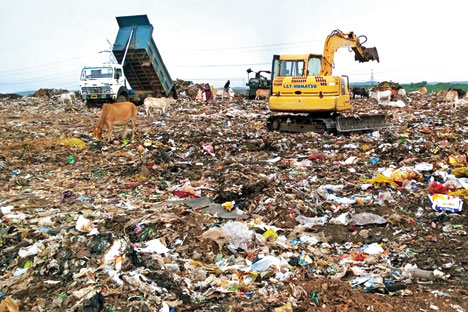



Waste-to-energy plant
The plan
The corporation had in 2008 earmarked Bhuasuni for dumping solid waste and in 2015 it decided to set up a waste-to-energy plant at the site. This was aimed at proper management of solid waste, employment generation and producing 12MW energy. The yard is spread over 44 acres and the waste-to-energy plant would take up 30 decimal of it.
The status
The plan has not moved an inch following opposition from nearby villagers. The delay in execution of the plan has led to improper management of solid waste at the site.
What people say
They want to set up the plant without considering its consequences on us. The dump yard is a health hazard, the plant will only add to it
Prasant Mahakur, Daruthenga resident
Plastic waste treatment plant
The plan
In 2016, the Bhubaneswar Municipal Corporation mooted a plan to set up a Rs 1.40crore plastic waste treatment facility at its temporary transit station near Sainik School. The initial steps were taken, including roping in rag pickers for proper
segregation of waste and the Central Institute of Plastic Engineering and Technology to train them.
The plant was planned to treat at least five tonnes of waste daily.
The status
The civic body has attributed the non-execution of the project to the introduction of the new Plastic Waste Management Rules, 2016.
What people say
It is sheer apathy of the civic body not to have a proper mechanism for the most hazardous waste and a threat to environment
Asit Mohanty, Acharya Vihar resident
Decentralised compost plants
The plan
Acting on a directive from the Union ministry of housing and urban affairs, the housing and urban development department decided to set up decentralised compost plants to treat biodegradable waste and also help creation of compost for agricultural use. In 2016 it was decided to set up five such plants at the temporary transit station near Sainik School. It was calculated that of the 450-odd tonnes of municipal solid waste the city produces, nearly 100 tonnes of biodegradable waste would generate good revenue for the civic body.
The status
The plan has remained a non-starter due to the absence of a mechanism to segregate the biodegradable waste from solid waste.
What people say
The compost generated provides carbon and nutrients to soil. It has the capacity to increase productivity of crop, but the civic body is simply wasting resources
Sailabala Padhi, environmentalist
Wastewater treatment plants
The plan
In 2016, the government issued the Odisha Urban Septage Management Guideline to deal with wastewater. This new guideline underlined setting up of wastewater treatment plants, where septage collected from households and other facilities would be treated before its release in rivers and drains.
The status
This plan has been a success story. Construction of the plants is on the fast track at Kalinga Nagar, Basuaghai and VSS Nagar. Work on the wastewater treatment plant at Basuaghai is nearing completion, while the one at Kalinga Nagar is half done. Search is on for a suitable land at VSS Nagar.
What people say
The outbreak of various water-borne disease is due to releasing of septage directly into open drains. The treatment of wastewater would avert this health hazard
Chinmay Jena, Jharana Sahi resident
What mayor says
We will shortly take up the waste-to-energy project at Bhuasuni. Similarly, we will register users and take steps to discourage the use of plastic in the city. For compost plants, we will register major generators of biodegradable waste and take steps to transport waste for treatment
Ananta Narayan Jena
Text by Sandeep Mishra, pictures by Ashwinee Pati










